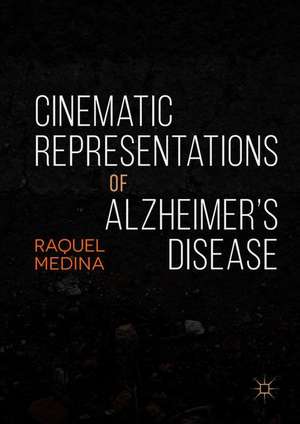Cinematic Representations of Alzheimer’s Disease
Autor Raquel Medinaen Limba Engleză Hardback – 25 aug 2018
Preț: 730.79 lei
Preț vechi: 891.21 lei
-18% Nou
Puncte Express: 1096
Preț estimativ în valută:
139.84€ • 146.37$ • 116.39£
139.84€ • 146.37$ • 116.39£
Carte tipărită la comandă
Livrare economică 31 martie-14 aprilie
Preluare comenzi: 021 569.72.76
Specificații
ISBN-13: 9781137533708
ISBN-10: 1137533706
Pagini: 256
Ilustrații: XII, 224 p. 23 illus. in color.
Dimensiuni: 148 x 210 x 20 mm
Greutate: 0.54 kg
Ediția:1st ed. 2018
Editura: Palgrave Macmillan UK
Colecția Palgrave Macmillan
Locul publicării:London, United Kingdom
ISBN-10: 1137533706
Pagini: 256
Ilustrații: XII, 224 p. 23 illus. in color.
Dimensiuni: 148 x 210 x 20 mm
Greutate: 0.54 kg
Ediția:1st ed. 2018
Editura: Palgrave Macmillan UK
Colecția Palgrave Macmillan
Locul publicării:London, United Kingdom
Cuprins
1. Introduction.- 2. Old Age and Alzheimer's Disease in Film.- 3. Intergenerational Interactions and Alzheimer's Disease.- 4. Gender and Alzheimer's Disease: The Power of Words, Herbs, Water, Veils and Mountains.- 5. Agency and Masculinity in Alzheimer's Disease: Cortex (2008) and The Memory of a Killer (2003).- 6. Recovering the Past: Historical Memory and Alzheimer's Disease.- 7. Conclusion.
Notă biografică
Raquel Medina is Senior Lecturer in Spanish Studies, Aston University, UK.
Textul de pe ultima copertă
This book offers a cross-cultural approach to cinematic representations of Alzheimer’s disease in non-mainstream cinema. Even though Alzheimer’s disease, the most common form of dementia, is a global health issue, it is not perceived or represented homogenously around the world. Contrary to very well-known mainstream films, the films discussed do not focus on the negative aspects normally associated with Alzheimer’s disease, but on the importance of portraying the perspective of the persons living with Alzheimer’s and their personhood. Similarly, this book analyses how the films use Alzheimer’s as a trope to address issues relating to different areas of life and society such as, for example, family matters, intergenerational relationships, gender issues, national traditions versus global modernity, and caring for people with dementia. By examining an array of films, from crime fiction to documentary, that each present non-stigmatising representations of Alzheimer’s disease, this in-depth study ultimately demonstrates the power of culture in shaping meaning.
Caracteristici
Provides a comparative and cross-cultural analysis of cinematic representations of Alzheimer’s disease in Spain, France, The Netherlands, Turkey, South Korea, Iran, Mexico, Chile and Canada Focuses on non-mainstream films to convey a diverse variety of local /national perceptions and representations of Alzheimer’s disease Offers a positive and life-affirming approach to Alzheimer’s disease
